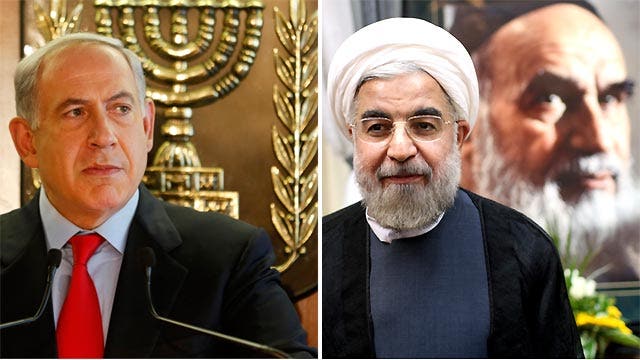Is Israel serious about striking Iran?
Retired United States Navy Admiral Timothy Keating on what Benjamin Netanyahu strategy is against Tehran
Nuclear talks this week in Geneva between Iran and six world powers, including the U.S., have raised hopes that both sides will strike a deal. Diplomats suggest Tehran is willing to compromise in order to win relief from tough economic sanctions against the country.
Israel has cautioned the U.S. on dealing with the Iranian regime. Israeli Prime Minister Benjamin Netanyahu said he welcomes a diplomatic solution, but he cautioned against lessening Iranian sactions.
Fox News National Security Analyst KT McFarland asked United States Navy Admiral Timothy Keating (Ret.) how countries in the region, including Israel, perceive Iran’s nuclear program.
“Hard to predict with any certainty … any perception or positive proof that Iran has deliverable, weaponized nuclear weapons would be a significantly destabilizing factor in the Middle East,” said Keating. “None of the other countries would welcome this … and would likely take some measures on their own to combat this developing threat.”
The threat of a nuclear arms race in the Middle East also remains a factor if Iran develops a weapons program.
While Keating says it’s possible as of now, it’s unlikely that a nuclear race will come about. “I don’t have any reason that it will happen but … many of those countries have pretty deep pockets.”
This raises the possibility that they could afford to create their own weapons programs.
Netanyahu continues to remind Iranian President Hassan Rouhani that it would never allow for a nuclear-armed Iran.
“If you take them at their word that might include the possibility of launching a retaliatory strike or striking in advance of a final development of the weapon,” said Keating. “Iran - while their forces are old and not well trained … nonetheless they have reasonable capability” to fight off an attack said Keating.
Keating sees an Israeli strike on Iran as a formidable task. “The likelihood of their succeeding isn’t 100% … if they [Israeli fighter pilots] do get to the target the likelihood of completely eliminating the Iranian nuclear program isn’t high.” He added, “some of their [Iran’s] targets are deeply buried and very well protected.”
“Israel views this as a significant problem … we can all be hopeful that there will be positive developments that come from the [Geneva] talks but we have to be prepared … if the talks fail,” said Keating.
Watch the full interview with United States Navy Admiral Timothy Keating (Ret.) above.

